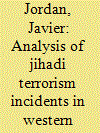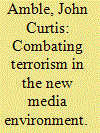|
|
|
Sort Order |
|
|
|
Items / Page
|
|
|
|
|
|
|
| Srl | Item |
| 1 |
ID:
112882


|
|
|
|
|
| Publication |
2012.
|
| Summary/Abstract |
This article offers a descriptive analysis of jihadi terrorist activity in Western Europe during the years 2001-2010. Following collection and classification, the information has been analyzed using the following variables: target countries, terrorist method used, stays in training camps, links to organizations, and degree of completion of the terrorist incidents.
|
|
|
|
|
|
|
|
|
|
|
|
|
|
|
|
| 2 |
ID:
112879


|
|
|
|
|
| Publication |
2012.
|
| Summary/Abstract |
Since the 1990s, jihadist terrorists have leveraged the power of the Internet in more imaginative ways than state security services charged with countering them. Terrorist groups are now harnessing the unique characteristics of the new media environment that has taken shape in the past decade, while security services struggle to conceptualize this rapidly evolving virtual landscape. But new media offers unique opportunities to these services, particularly intelligence agencies, to confront the terrorist threat. Identifying and exploiting these opportunities, both strategic and tactical, will lend critical advantage to governments in their worldwide confrontation with global jihadists.
|
|
|
|
|
|
|
|
|
|
|
|
|
|
|
|
| 3 |
ID:
112881


|
|
|
|
|
| Publication |
2012.
|
| Summary/Abstract |
Islamist extremists in Afghanistan and elsewhere are exaggerating their successes in inflicting casualties on American and other International Security Assistance Force (ISAF) forces. This article quantifies the exaggeration for the month of November 2010, putting the claimed casualty rate at approximately one-half battalion per month. It provides an analysis of how and why this is occurring, and links this extremist strategic communication effort to dominant historical master narratives in the region that may produce sympathy among intended recipients of the messages. The authors argue that these measures undertaken by the extremists can be countered successfully through the use of similar story forms, more timely reporting, use of side-by-side comparisons, and use of similar reporting venues. These steps could challenge the credibility of the Taliban reports, reduce sympathy, and diminish potential recruitment.
|
|
|
|
|
|
|
|
|
|
|
|
|
|
|
|
| 4 |
ID:
112880


|
|
|
|
|
| Publication |
2012.
|
| Summary/Abstract |
This article presents the key findings of an evaluation of a mentoring scheme being implemented for individuals deemed vulnerable to violent extremism in the West Midlands region in the United Kingdom. The key findings of this study are, firstly, that mentoring around violent extremism carries distinctive features, and can be distinguished from mentoring in other areas of criminal behavior or in drug/alcohol use. Secondly, there is ongoing debate around what the purposes of mentoring are; crystallizing around the key question of whether mentoring in the area of violent extremism is about changing beliefs or changing behavior, or both; therefore, how to measure success? The article examines the different theoretical fields in relation to de-radicalization, disengagement, desistance, and debiasing in order to situate the article's findings in a broader body of work. This article also links individual mentoring to the notion of community, for it is important to consider the individual who is being mentored in relation to the broader set of communities that they belong to or associate with. Here, it is stressed that in the United Kingdom there are significant tensions between approaches that emphasize community cohesion, and those that emphasze liberal freedoms associated with liberal democracy, particularly in relation to Al Qaeda-linked extremism.
|
|
|
|
|
|
|
|
|
|
|
|
|
|
|
|
|
|
|
|
|